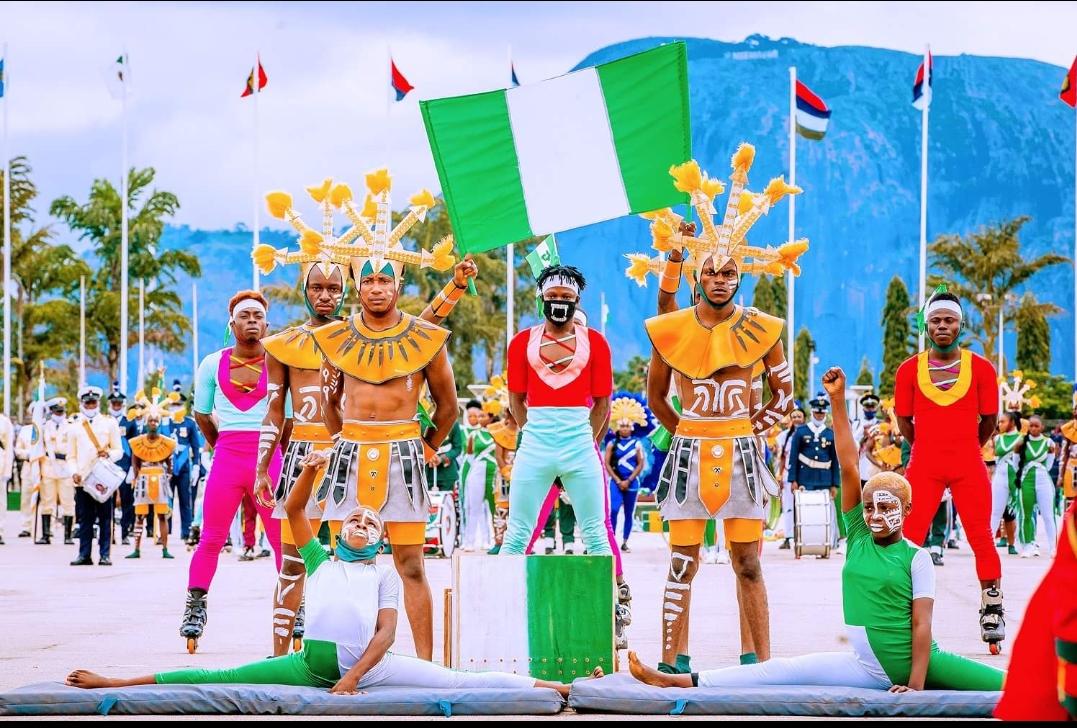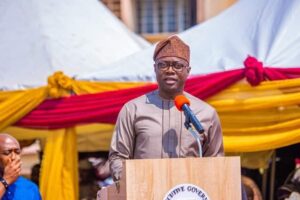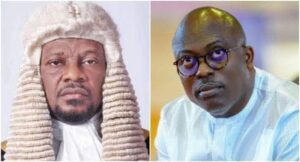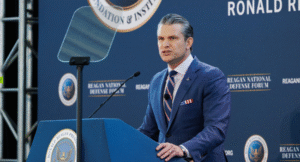
Is it finally time for the country to break up? I have never hidden where I stand: I believe in one Nigeria. It is not because I am such a wonderful patriot. No. But I have gone round Nigeria and interacted intensely with ordinary Nigerians. I have always come to the conclusion that we are not sworn enemies. Rather, we are victims of elite manipulation and political mismanagement. I have always concluded that we can live and prosper together “in peace and unity” if the political and economic conditions are right. But my opinion is just one out of 200 million. It is a drop in the ocean. I have now reached a stage in my life that I don’t care again. Whatever we settle for, life goes on.
But how many countries would Nigeria split into? Nobody has mandated me to work it out, yet it gives me a headache whenever I think about it. On paper, given the ongoing campaign that “the north is dragging us backward”, we should ordinarily suppose that Nigeria would break into two: the Democratic Republic of Southern Nigeria and the Republic of Northern Nigeria. I went for this preliminary assumption because the south seems united against the north. Many people also assume Nigeria to be simply north and south. Power rotation is often about north and south. There is also a prevailing international typecasting of Nigeria as “Muslim north and Christian south”.
Down south, the Democratic Republic of Southern Nigeria, DRSN for short, will have two dominant ethnic groups: Igbo and Yoruba. The DRSN minorities may accuse them of feeding fat on their oil — the same accusation the north faces perennially. As things stand, oil is still the biggest contributor to the national purse. Most of the economic calamities that befell Nigeria recently stemmed from falling oil revenue. Will DRSN leaders grant “fiscal federalism” to the oil-rich states? If so, the non-oil states may face a crippling fiscal crisis and lapse into the beggar-thy-neighbour mode, but they should all be fine “las las” (if you don’t understand Nigerian English, that’s “in the final analysis”).
No, I wouldn’t put Igbo and Yoruba together in DRSN. That would be too risky. It would only increase my headache. More so, the Niger Delta may become suspicious of both of them. If Yoruba and Igbo complained about being dominated by Hausa-Fulani in the defunct Federal Republic of Nigeria, so would the Ijaw, Urhobo, Edo and Ibibio, among other smaller groups, complain of being dominated by Yoruba/Igbo oligarchy in DRSN. It was not that difficult to get the southern minorities to back out of Biafra in 1967. It was as simple as telling them the Igbo were only after their resources and that they would become second-class citizens. It worked like magic. I think DRSN will be not one country.
It is, therefore, more convenient for me to see the south breaking into three: Republic of Oduduwa for Yoruba, Republic of Biafra for Igbo and Republic of Niger Delta for the oil-producing region. At the beginning of the Republic of Oduduwa, I can see some fiscal crisis. As things are, only Lagos state pays salaries and pensions and still executes projects without much sweat, apart from taking a lot of debt. The state will have to be its brothers’ and sisters’ keepers by helping other O’dua states with the wage bill. Remember that the Niger Delta oil money will be gone. Even Ondo state that is “oil-rich” still struggles to pay its bills. Lagos state will become the Niger Delta of Oduduwa Republic.
Let me explain with statistics. According to the boffins at StatiSense who analysed data provided by the National Bureau of Statistics (NBS), all the six south-west states internally generated a total revenue of N516.01 billion in 2020. Out of this, Lagos alone generated N418.99 billion, representing 81.2 percent. That is, for every N100 generated in the south-west, Lagos contributed N81. Without Lagos, the entire internally generated revenue (IGR) of the south-west was N97.02bn. If not for federation allocations, no south-west state would still be alive today. From the NBS data on IGR, most states are fiscally challenged and only a handful can survive without the oil revenue.
Does that mean Lagosians will resent other O’dua states as “parasites on our IGR”? An Ondo man once grumbled to me that Chief Obafemi Awolowo used their cocoa revenue to develop Ibadan, and that Ondo was marginalised. Will political violence, the type we see regularly in Ibadan and Lagos, disappear in O’dua Republic? Will there be cries of marginalisation? Currently, Oke Ogun people say they are denied Oyo governorship; Yewa people say they can’t produce an Ogun governor; same with Awori in Lagos; and the Muslim Rights Concern (MURIC) says south-west Muslims are marginalised, particularly in Ondo and Ekiti states. But O’dua Republic will be fine “las las”.
Should we expect a Biafra where everything will be based on merit and where no part will complain of marginalisation? Will there be quotas for educationally disadvantaged Biafran communities or will it be the battle of the fittest, where only the fittest of the fittest shall survive and stay alive? Will there be “federal character”, so that a Biafran president of Wawa extraction does not fill his cabinet with Wawa appointees? Will “merit” be tempered with power rotation so that Anambra does not produce Biafran presidents non-stop using their big voting population? Will the Ezza/Effium communities in Ebonyi finally stop killing each other? Never mind, Biafra will be fine “las las”.
Will the Republic of Niger Delta be the most prosperous of the post-Nigerian entities, with billions of petrodollars cementing their progress after years of “exploitation” and “oppression” by the Nigerian nation? Have their leaders done commendably well with 13 per cent derivation? If yes, imagine what they can do with 100 per cent! Will the over 50 ethnic groups become united and peaceful in the absence of the Nigerian “parasites”? Will the Niger Delta Development Commission (NDDC), which has received over $50 billion since inception, finally go nuclear? Some say more money has not produced more development in the region — but the Republic of Niger Delta will be fine “las las”.
Meanwhile, the popular assumption down south is that the north is one. When President Muhammadu Buhari named Mr Boss Mustapha as SGF in 2017, someone shouted: “Yet another Fulani Muslim!” He didn’t know that Mustapha is neither Fulani nor Muslim. Actually, some of those tagged Fulani in Buhari’s government are not. There are close to 200 ethnic groups up north. Since religion is the strongest identity over there, a single Republic of Northern Nigeria may not be fit for purpose. We may need two northern countries to achieve a semblance of homogeneity: the Islamic Republic of Northern Nigeria (IRNN) and the Middle Belt Republic of Nigeria (MBRN).
Will the Islamic Republic of Northern Nigeria — where cholera can be described as a punishment for adultery and mannequins classified as symbols of immorality — finally find peace in the bosom of the Lord? Will IRNN end the crushing poverty and abject underdevelopment dotting its landscape? Will the millions of out-of-school children and thousands of communities drinking from dirty river and getting afflicted with water-borne diseases finally find fulfilment in a Muslims-only country? Will Shi’ites and Sunnis sheathe the sword and embrace each other? Will Boko Haram finally accept fellow Muslims as true Muslims and stop killing them? In that case, IRNN will be fine “las las”.
“Middle Belt” is the euphemism for Christian north, so I automatically assume they will need their own country. But why do I think it would be a geographical nightmare to create a country for the Christians spread across Kebbi, Kaduna, Borno, Gombe, Niger, Bauchi, Kwara, Kogi, Benue, Plateau, Nasarawa, Taraba and Adamawa? You can’t even draw the northern Christian map on paper! But if we manage to separate the Christians from the Muslims and create a country for them, I suspect there will still be cries of marginalisation by Idoma in Benue and scores of ethnic groups in Plateau, Kaduna, Niger and Nasarawa. But the cumbersome multi-ethnic MBCRN will be fine “las las”.
There are times I wish we could perform an experiment: break up Nigeria for 10 years and see how the new countries will be run. If it works, we can then kiss Nigeria goodbye. But here is my biggest headache: if Nigeria finally breaks up, will every Igbo relocate to Biafra, Yoruba to O’dua Republic and Hausa-Fulani to IRNN? Nigerians live in other countries such as Republic of Benin and Ghana, so I am afraid ex-Nigerians will still live and work in other regions of the defunct Nigeria. In that case, they will still have to learn to live together and tolerate one another. Above all, good governance will still be critical to development. And conflicts will not end — they will only take new shapes.








